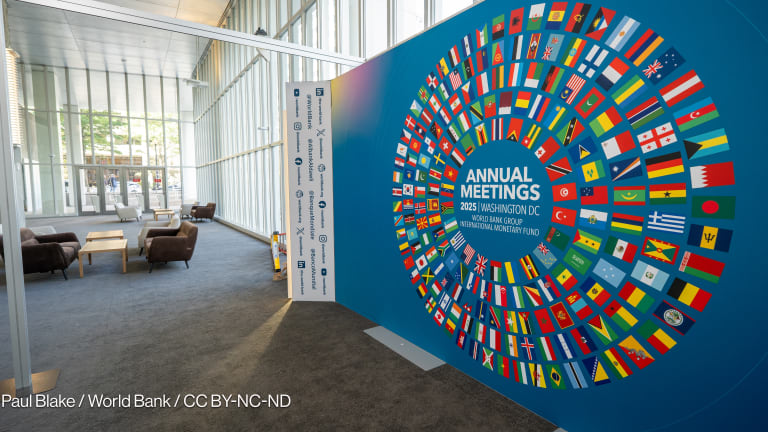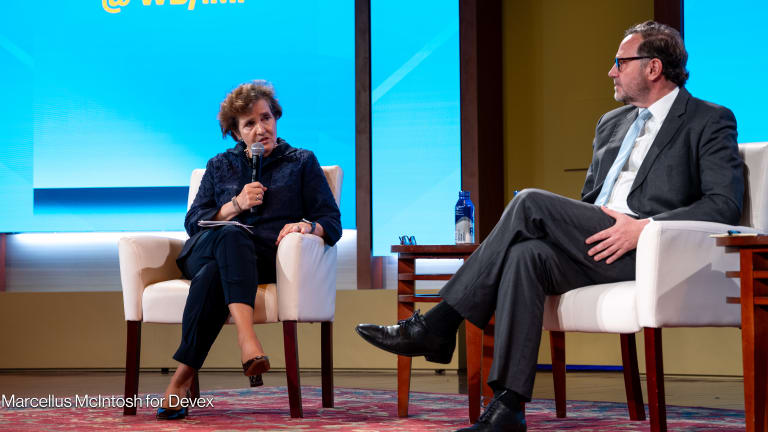
On Tuesday, the Organisation of Economic Co-operation and Development concluded the high-level meeting of its Development Assistance Committee. Ministers from the 30 DAC member countries spent two days deliberating important and topical issues that affect aid and development spending on the ground.
The agenda included important areas such as reporting standards on in-donor refugee costs, blended finance principles, and the mandate of the DAC itself. While technical in nature, these topics may have a profound effect on quality of development outcomes and ultimately on the lives of the world’s most vulnerable people.
In the months leading up to the meeting, civil society organizations had engaged with DFID, outlining propositions of potential official development assistance rule changes that could ultimately lead to increased aid effectiveness, as well as measures that would not be supported by civil society — meaning, anything that diverted aid away from the world’s poorest people. The devastation caused by Hurricane Irma brought to the fore issues around the long-term effects to regions and small island nations that endured significant financial setbacks as a result of natural disaster or humanitarian crisis, as well as the issue of giving aid to British overseas territories devastated by the hurricane.
UK proposal on aid for overseas territories withdrawn at DAC, but sparks debate
The U.K. delegation at the Development Assistance Committee's high-level OECD meeting in Paris on Monday was forced to withdraw a proposal to "waive" aid eligibility requirements for rich, crisis-hit states after it failed to secure a consensus. But sources told Devex the proposal was partly responsible for reigniting a key debate over ODA eligibility that could lead to changes in the future.
The U.K. raised this specific case as rescue and recovery efforts for overseas territories could not be counted as ODA as they had very recently graduated from the DACs list of ODA eligible countries. The DAC committed to two significant tranches of work.
First, OECD DAC agreed to establish a process to examine short-term financing mechanisms available to respond to catastrophic humanitarian crises in countries recently graduated from the ODA eligible list. This would address the scenario seen in British overseas territories after Hurricane Irma and could include ODA spending based on objective criteria set by the DAC.
Second, DAC agreed to explore what “reverse graduation” could look like in practice. This followed an acknowledgement that there are no rules at present around whether a “graduated” country or territory can go back onto the DAC list of ODA eligible countries should they later suffer a persistent drop in their per capita income, pushing them below the World Bank high-income threshold. To understand what this could look like in practice and how it might affect the integrity of the rules, the DAC has now requested evidence-based proposals from its secretariat to allow reinstatement for those who have graduated.
Given the huge inequality of wealth that exists in a number of these small island nations and the potential for unintended consequences by counting rescue and recovery efforts as ODA eligible carte blanche, there is rightly a debate as to what a humanitarian response should look like. It’s a welcome step for the DAC to formally acknowledge that effects of natural disaster and humanitarian crisis could lead to a substantial and sustained drop in the GNI of a country. And the U.K.’s role in putting this on the DAC’s agenda should also be recognized.
However, civil society does not want to see this leading away from existing and already robust OECD DAC rules on ODA spending and diverting money away from the world’s poorest countries and people and toward the national interest of donor countries.
This week’s meeting reminded us of the value of multilateral systems when tackling complex global issues, the importance of securing consensus, and the value in basing rule changes on evidence-based analysis. It also highlighted the importance of multilateralism at a time of significant global challenge. Unilateral action by any member state could have led to weaker aid rules and thereby ineffective aid. It would have been the world’s poorest and most marginalized who would have suffered the consequences of such a step.
This wasn’t the case, and instead the outcome will ultimately benefit those in most genuine need and hopefully help those countries no longer dependant on aid from becoming so again.
Join the Devex community and access more in-depth analysis, breaking news and business advice — and a host of other services — on international development, humanitarian aid and global health.








